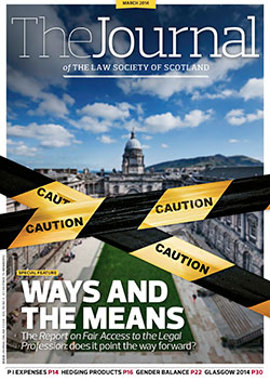Purpose of the protocol

Expenses
Lawson v Sabre Insurance Co (see November 2013 article) was a reported decision in a sequence of, in the main, unreported decisions relating to relatively low value personal injuries claims and the relevance or otherwise of the pre-action protocol. It is worthwhile bringing readers’ attention to the transcript of Sheriff Principal Stephen’s extempore opinion in Burns v Royal Mail Group Ltd, Edinburgh Sheriff Court, 30 January 2014.
Following an accident, a claim was intimated with an invitation to deal with matters in terms of the protocol. After six months, there was no decision on liability. The pursuer indicated that medical evidence of the claim would be disclosed after liability was admitted. Again, there was silence and an action was raised. This prompted a request for sight of the medical report and an indication that negotiations could take place “without prejudice”. Liability was not conceded. A tender was lodged along with skeletal defences.
Sheriff Principal Stephen observed that these defences did not assist resolution of the dispute or focusing issues. Expenses should follow success unless there was clear material pointing to unreasonable behaviour by the successful party. A pursuer was entitled to raise proceedings and know the basis on which the action was defended. The issue the courts had to address was not simply actions raised precipitately, but also defenders who deliberately did nothing, forcing a pursuer to litigate and then attempting to reduce their entitlement to expenses.
The protocol provided access to justice by enabling a low value claim to be pursued without a party being concerned that its value would be reduced significantly by liability for legal fees. While the deterrence of unnecessary actions was a valid goal, achieving that goal did not mean the sole focus was on the actions of a pursuer.
Jurisdiction
The issue of jurisdiction was raised in Worbey v Elliott [2014] CSOH 19 (6 February 2014), an action of count, reckoning and payment in which the pursuers resided in Scotland and the defender was domiciled in England. Lord Tyre concluded that, as a result of the pursuers averring that the defender was under a contractual duty to pay a profit share, the obligation to account was subsidiary to the one to make payment and thus the Scottish courts had jurisdiction. The pursuers were unaware of the extent of their profit share and thus the action had to take its present form.
Orders for disclosure
In Clark v Trip Advisor LLC [2014] CSOH 20 (6 February 2014), Temporary Judge Arthurson refused an application for disclosure of information under the Administration of Justice (Scotland) Act 1972. It was accepted that any action raised, if the information was disclosed, could be raised in Scotland. However the respondents were third party havers outwith Scotland, and the extent of the Act was limited to Scotland. In addition, the respondents’ jurisdiction clause precluded the Court of Session entertaining the application.
Competent and omitted
The operation of this preliminary plea was examined by Lord Burns in Fee v Child Maintenance and Enforcement Commission [2014] CSOH 32 (20 February 2014). By reference to authority, his Lordship determined that in considering the plea, the court looks to whether the matter of fact or law which a party failed to advance in the previous proceedings was one which could have competently been advanced, as opposed to examining subjectively whether it was reasonable to expect him to have done so.
Adults with incapacity
In M v M, Edinburgh Sheriff Court, 14 March 2013, Sheriff Morrison determined that, in circumstances in which an application for renewal of guardianship is opposed and the objector seeks to be appointed sole or additional guardian by lodging a minute in process, there is no requirement for that minute to be accompanied by reports in terms of s 57(3) of the Adults with Incapacity (Scotland) Act 2000. Reports would already be lodged in relation to the renewal application, and it was likely that the minuter’s claim would be known by, and thus commented upon by, the mental health officer. The suitability of the powers sought would be investigated in the course of determining the contested application. Further, an application for appointment as additional guardian could quite appropriately be made by minute.
In Ward, Applicant 2014 GWD 3-59, Sheriff Principal Kerr made observations regarding procedure which was appropriate if a power was sought to execute a will on behalf of the adult. First, he observed generally that when making decisions in such cases, the court required to put the interests of the adult, who will not usually be a party to the proceedings, first in deciding what procedure should best be followed. Further, in dealing with such a specific application where there was no dispute and all professional opinion pointed in the same direction, the grant of such an order might be reasonable with only basic evidential material. Where, however, there was an element of dispute, an evidential hearing might well be required to examine all issues, with someone appointed to safeguard the adult’s position. (See further Journal, February 2014, 18.)
Sheriff Principal Kerr also observed, in relation to summary applications generally, that while the sheriff had a discretion to adopt whatever procedure was thought most appropriate to dispose of the application in accordance with the requirements of justice, that discretion must be properly exercised if it is to remain inviolate from the attentions of an appellate court.
Summary decree
The defender in Maclay Murray & Spens v Orr, Glasgow Sheriff Court, 19 December 2013, appealed against the grant of summary decree. Sheriff Principal Scott determined the mere fact that there was a disputed issue did not prevent the matter being resolved at the stage of summary decree. The terms of OCR, rule 17 did not require a party moving for summary decree to prove the tenor of any document relied on. It was a question for the sheriff at first instance to judge the weight to be placed on each matter.
Title to sue
In Nolan v Advance Construction (Scotland) Ltd [2014] CSOH 4 (17 January 2014) Lord Woolman, in circumstances in which the pursuer sought to advance an argument that invoices addressed to a company represented sums due by him personally, observed that it was inappropriate to blur the lines of legal personality without the clearest averments and proof. If an invoice was rendered to a company, it remained the company’s debt.
Duties on parties
The facts of RBS Invoice Finance Ltd v ASC Anglo Scottish Concrete Ltd, Glasgow Sheriff Court, 4 December 2013 are, in the main, particular to that decision. However, one matter which is worth noting is the observation from Sheriff Principal Scott that a director of a corporate body, though unable to represent that body in litigation, can still, for the purposes of indicating that an action or defence is being insisted on, appear to seek a continuation to enable representation to be secured and thus avoid decree passing.
Caution
In Duff v Shearer [2014] CSIH 20 (11 February 2014) Lord Eassie observed, in an appeal against the granting of absolvitor following a failure to find caution, that the court at first instance was entitled to consider the competency and relevancy of the pursuer’s action and the fact that he had numerous awards of expenses outstanding against him, made in actions of a similar nature.
Unrepresented party defender
In Angiolini v Green [2013] CSOH 196 (19 December 2013), the defender was the subject of a claim for a non-harassment order and interdict. He was unable to secure legal aid and representation, and argued that his article 6 rights were consequently infringed. Lord Bannatyne considered that there was nothing inherently unfair in a party defending an action without legal representation. The defender had also had almost six months’ notice of the pursuer’s arguments to be made at debate.
Small claims
In Carr Berman Crichton Ltd v Jones, Glasgow Sheriff Court, 29 January 2014, Sheriff Bovey considered the expenses position when an agreed settlement had been reached between parties which did not include expenses. He concluded that, in such circumstances, the defender had stated a defence but had not insisted on it, and was thus liable for expenses, which had to be assessed by reference to the summary cause scale in terms of s 36B of the Sheriff Courts (Scotland) Act 1971.
Sexual offences prevention orders
In Chief Constable v DJR [2014] CSIH 8; 2014 GWD 3-60 Lord Carloway determined that where the application to vary, renew or discharge an interim order was made in the same sheriffdom, there was no need for a fresh initial writ, albeit in the event of a person moving sheriffdoms, a fresh application would be needed. The existence of a crave for an interim order, provided the crave itself is not expressly time limited, allowed the sheriff to vary, renew or discharge that order. This assumed that the crave for the SOPO contained all the necessary elements required in the motion for any variation, and that the averments in the writ, coupled with the formal information regarding the progress of the action, were sufficient to justify any variation or renewal. If not, an amendment would be required to provide fair notice of what was being sought and the basis for it.
His Lordship observed that the original interim order and any renewal must be for a fixed period, with the date on which the order is to expire specified. The period selected would normally reflect the time it would take for the order to be determined. Given that the procedure was summary, the period should be relatively short and continuations in the process rare. Since the court must consider whether the period specified was just, it was inappropriate to make an interim order to expire on determination of the main application.
Update
Since the last article, Martin and Co (UK) Ltd, Petrs (January article) has been reported at 2014 SLT 71, Scottish Professional Football League Ltd v Lisini Pub Management Co Ltd (January) at 2014 SLT 99, Smith v Greater Glasgow and Clyde NHS Health Board (January) at 2014 SLT 137, and Lawson v Sabre Insurance Co (November 2013) at 2014 SLT (Sh Ct) 10.
In this issue
- The role of "attachment" in child custody and contact cases
- No protocol – what expenses?
- Ecocide: a worthy "fifth crime against peace"?
- Mandatory mediation: better for children
- Reservoir safety regulation: a changing landscape
- Reading for pleasure
- Opinion: Mark Hordern
- Book reviews
- Profile
- President's column
- Digital deeds move closer
- Fair access - a fair way to go
- No protocol – what expenses? (1)
- Hedges: not all bad news
- Daring to be different
- Financial planning or wealth management – is there a difference?
- Success in the balance
- Wealth management for business leaders and owners
- Purpose of the protocol
- Actionable data wrongs?
- Land Court: business as usual
- Penalty points
- Scottish Solicitors' Discipline Tribunal
- Fever pitch
- Heritage regained
- All grist to the mill
- Wills: is it OK to act?
- Gongs, dinners and just deserts
- Perils of the home
- Ask Ash
- Scots lawyers debate Union in London
- Public Guardian news roundup
- Law reform roundup
- Personal Injury User Group at your service
- Diary of an innocent in-houser






